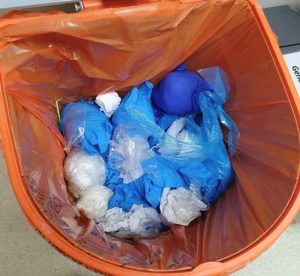The impact of waste management during COVID-19
As the COVID-19 pandemic continues into the summer months it is as important as ever that businesses continue to play their part in ensuring that any waste generated from a possible or a confirmed case of coronavirus is disposed of correctly to help to protect people, health, and the environment.
The current Government guidance in the UK “COVID-19: Guidance for infection prevention and control in healthcare settings” is that any waste generated from a possible or a confirmed case of coronavirus must be disposed of as Category B infectious waste and is suitable for alternative treatment (AT) disposal.
This means that any soft infectious waste produced, such as PPE (gloves, face masks, aprons) paper towels, swabs etc. should be packaged in orange clinical waste bags (UN number UN3291) and be correctly sealed and marked before being collected and taken for alternative treatment disposal.
Additional waste = additional cost
The need for additional PPE has led to the use of predominately plastic items, such as aprons, full coverage gowns and full-face visors.
Many practices have seen a steep and unsustainable increase in their clinical waste production due to the sheer volume of plastic being used per patient, as a result many practices have reported that their clinical waste doubled not only in quality but also in price.
Prior to COVID, an average 4 surgery practice would produce between 12-15 clinical waste bags, with this amount being tightly managed to ensure all bags were fully utilised before collection, many managers of dental practices found that they were constantly shopping around for a better deal as prices continued to grow, making waste management top of the practice meeting agenda every month.
When COVID hit, the financial stability of many practices came into question, how would we survive this pandemic? How can we continue to provide the same service with an increase of inappropriately priced PPE? Not even considering the reduction in patients and the implementation of fallow time. However, as we progressed and adapted, a new obstacle arose – clinical waste! And it was a big one.
How can we reduce our clinical waste?
Well, it’s simple, reduce surface area.
I have a fantastic team, who after many weeks of brainstorming discovered a way to reduce the mass of plastic into a single glove.
How you ask, the answer is simple – PPE balls
When ready to doff your level two PPE, simply:
- Remove one glove first and pull your gown off, as you pull it off begin to scrunch the gown into the glove
- The gowns are a thin plastic that can be compressed tightly into the smaller vessel of the empty glove
- Once all of your plastic waste is removed, use the other glove to wrap it again, you then have a tightly wrapped PPE ball
Figure 1 demonstrates our waste after a full day of AGP
These PPE balls create less surface area inside the bin allowing you to compress and compact more into that space.
There is less air inside the bag, meaning you can fit more into the bag. We are charged per bag, not by the weight of the bag so we are now saving more money on our clinical waste bills every month, as we are now producing less waste than we did before COVID.
We have also found that stacking empty cups up into a tower in the corner of the bin, again creates less surface area – allowing the PPE balls to be neatly and precisely placed around them.
Team working
Careful and well managed training of your staff is paramount to this method being a success, and everyone must be on board for it to work.
Regularly reviewing the method with your team and updating them with the savings will be a great incentive to keep them enthused and engaged. Sharing some of those savings with the team for their efforts or a well-earned lunch will most definitely help keep them involved and on the same page as senior management in their efforts to stabilise overheads.
COVID-19 may have created new obstacles, but it has also generated a passion for problem solving! There is nothing I enjoy more than solving an operational hurdle and seeing the benefits of that in action.
Now, my next mission is how to reduce the environmental impact of COVID-19 through our waste management procedures.



